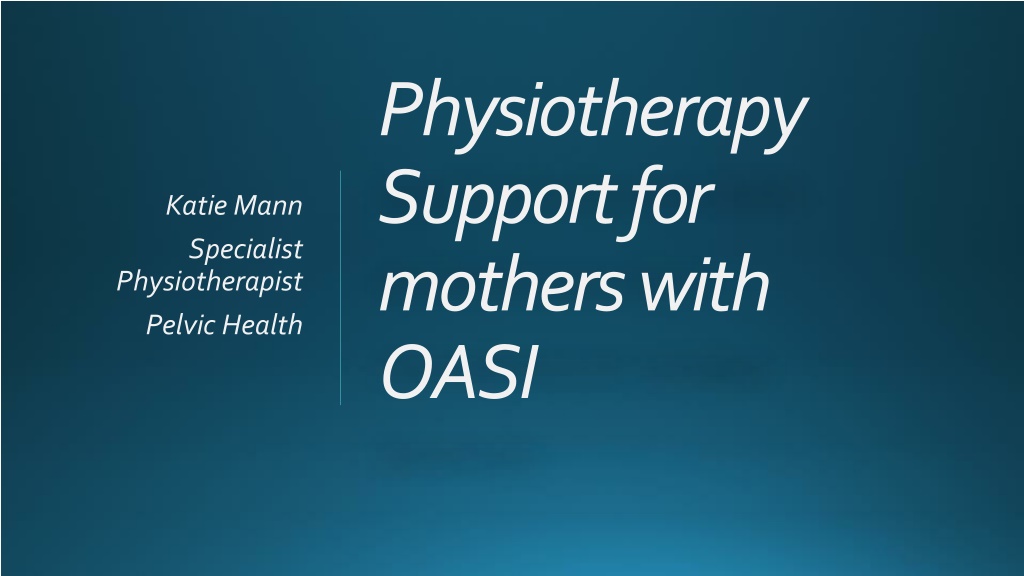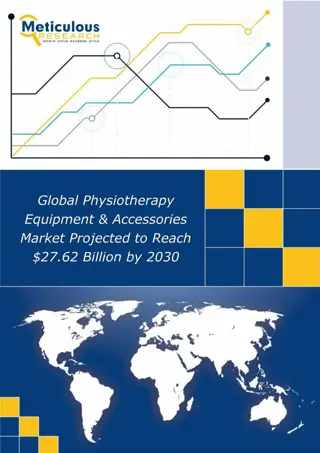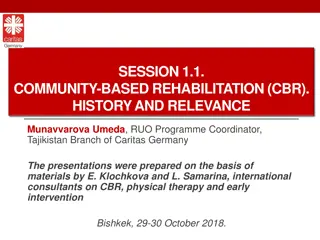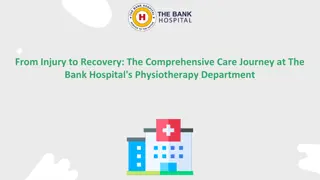Physiotherapy Support for Mothers with OASI - Expert Guidance and Rehabilitation
Providing specialized physiotherapy support for mothers experiencing Obstetric Anal Sphincter Injuries (OASI) is crucial for addressing immediate problems like pain, urinary or fecal incontinence, and more. With a focus on pelvic health, this approach involves reassurance, tailored pelvic floor muscle rehabilitation, and guidance on wound care, bladder, and bowel management. The physiotherapy process includes detailed subjective and objective assessments, individualized pelvic floor muscle rehabilitation, exercise prescription, and ongoing support to help mothers regain function and confidence post-delivery.
Download Presentation

Please find below an Image/Link to download the presentation.
The content on the website is provided AS IS for your information and personal use only. It may not be sold, licensed, or shared on other websites without obtaining consent from the author. Download presentation by click this link. If you encounter any issues during the download, it is possible that the publisher has removed the file from their server.
E N D
Presentation Transcript
Physiotherapy Support for mothers with OASI Katie Mann Specialist Physiotherapist Pelvic Health
Immediate Problems Pain Urinary or faecal incontinence Urinary retention Inability to pass faeces
Problems associated with continence 67% of pregnant women experience stress urinary incontinence during pregnancy 38% of women experience stress urinary incontinence afterchildbirth 2-10% of women experience bowel incontinence after childbirth
Good News Women should be advised that 60 80% of women are asymptomatic 12 months following delivery and EAS repair RCOG 2015
What happens in physiotherapy? NOT THIS !
Role of physiotherapy Reassurance and advice wound care, bowel & bladder advice, basic PFE Timing not too soon but also don t put up with it Specialist assessment to include examination Individualised, progressive supervised pelvic floor muscle rehabilitation with biofeedback Identify if / when to refer to other services
Physiotherapy Assessment Subjective detailed questioning about:- general medical and surgical history obstetric history this delivery previous symptoms current symptoms (bladder, bowel, prolapse, sexual function) the woman s personal goal
Physiotherapy Assessment Objective assessment of the pelvic floor (Examination) : anatomy skin sensation muscle profile (strength, endurance, speed of response, ability to relax) Measurements EMG or U/S
Pelvic Floor Muscle rehabilitation Individualised, progressive, functional PFE Prescription of exercise Importance of sticking to the programme 4 months of exercise Maintenance programme Biofeedback EMG or ultrasound Neuromuscular Stimulation
Gadgets may be useful but only after a detailed assessment by a physio don t buy anything until you have been checked for suitability there may be medical reasons why not to use them Digital biofeedback (Elvie / Vibrance ) Spring-loaded resistance devices Electrical stimulator Apps can be useful to remind you to do the exercises Squeezy App My Pelvic floor Fitness (Tena physio) Pelvic Floor First (Australia)
Find a Physio you can find a pelvic health physio at this website, along with lots of useful information thepogp.co.uk GP / consultant / self referral























